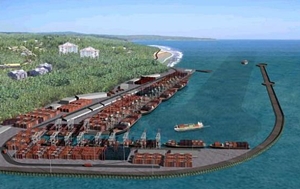Adani Ports starts construction at Vizhinjam, announces Rs35-cr CSR projects
07 Dec 2015
Adani Ports and Special Economic Zones Ltd (APSEZ), India's biggest private port operator, on Saturday kicked off construction of a new international container transshipment port at Vizhinjam, near state capital Thiruvananthapuram, in Kerala, the first in the country.
Adani also secured concessions in cabotage norms for operating the transshipment port with the Union government agreeing to ease a key law which will allow foreign container shipping lines to operate between the new port and other Indian ports.
Adani group chairman Gautam Adani also announced corporate social responsibility (CSR) programmes worth Rs35 crore for the welfare of people residing around the Vizhinjam seaport project.
"The roll out of the CSR initiative - Theera Samrudhi - would be over three years. The funds would mainly be spent in the fields of health, sanitation, drinking water projects and upgradation of local schools. We can ensure the fishing community that the port will never be a hindrance in their life. Instead, it would support and foster the future in several ways," he said.
Adani also said the group would help members of the local people to upgrade their skill sets so as to explore business and job opportunities that come up along with the project. "We have provided all support to the local community everywhere we operate ports," he said.
Meanwhile Union minister for surface transport Nitin Gadkari said the government will give relaxation in cabotage rules for the port. ''We will relax cabotage for the new port,'' Gadkari said at the ground-breaking ceremony of the new port on Saturday.
The relaxation in cabotage norms is necessary for the viability of the project, billed the biggest infrastructure project yet in the southern state known more for tourism.
''Without relaxing cabotage, the project is not economically viable,'' Gadkari said adding that he will issue the order to give effect to his announcement in 15 days. The shipping minister said that demands to relax cabotage had ''confused'' him because there were two lobbies working at cross-purposes.
''I send the file on cabotage to the Prime Minister's Office requesting a decision on the issue. The PMO, however, sent the file back asking me to take a decision according to my judgment,'' he said.
India's coastal trade (shipping cargo between different local ports) is reserved for ships registered in India and foreign ships can be hired only when Indian ships are not available after taking permission from the country's maritime regulator, under the so-called cabotage law.
Currently, about 2.2 million twenty foot equivalent units or TEUs (the standard size of a container) are transshipped from India to ports like Colombo (Sri Lanka), Singapore, and Jebel Ali (UAE), adding to the cost of exporters and importers. Colombo and Singapore account for 66 per cent of containers transshipped from India.
Vizhinjam will be APSEZ's ninth port facility spread across the eastern and western coasts of India, including Mundra, Tuna-Tekra, Hazira, Dahej, Mormugao, Visakhapatnam, Kamarajar, and Kattupalli. ''If you look at the map, in Adani's sagar mala of ports, the pendant is here in Vizhinjam,'' said Santosh Mohapatra, director and chief executive officer of Adani Vizhinjam Port Pvt Ltd, the entity formed to build the new port.
The project will be given a viability grant funding or VGF of Rs1,635 crore to be shared equally by the central and state governments to boost its viability, making it the first port project to be offered such a grant. Of this, Rs1,227 crore will be given during the construction phase spread over four years (APSEZ, though, has set a target of 1,000 days to complete the project instead of 1,460 days) and the balance during the operation period spanning 40 years extendable by another 20 years.
''China handles 150 million twenty foot equivalent units (TEUs) a year, while India handles just 10 million TEUs a year. We need more ports,'' Gadkari said.
Vizhinjam is being developed as a container transshipment port with an investment of Rs5,552 crore to compete with Colombo, because its basic infrastructure such as water depth and proximity to the main shipping lane is better than Colombo which is the biggest transshipment facility in the region.
''About 30 per cent of the world's container traffic passes through this shipping channel,'' Gautam Adani, chairman of Adani Group said.
Colombo and Vizhinjam are located in close proximity to international shipping route involving only a marginal diversion of about 20-25 nautical miles. While Colombo has a water depth of 16 to 18 metres, Vizhinjam will have much deeper berths and approach channel of up to 20 metres, capable of docking mega container ships.
The first phase of the Vizhinjam port will have an 800-metre long berth capable of handling 1c million TEUs. The berth length will be extended to 2km in three phases with a capacity to load 3 million TEUs, which is the standard size of a container.
Vizhinjam will also be free to set rates on its own based on market forces. ''Vizhinjam will be the final answer to India's need for a container transhipment hub of its own,'' Adani Vizhinjam Port CEO Mohapatra said.
Another container transshipment terminal located a few nautical miles away, run by Dubai's DP World Ltd at Vallarpadam in Union government-owned Cochin port, is yet to pick up although it started operations in February 2011.



















